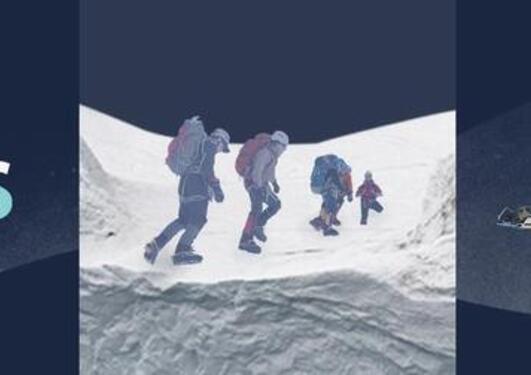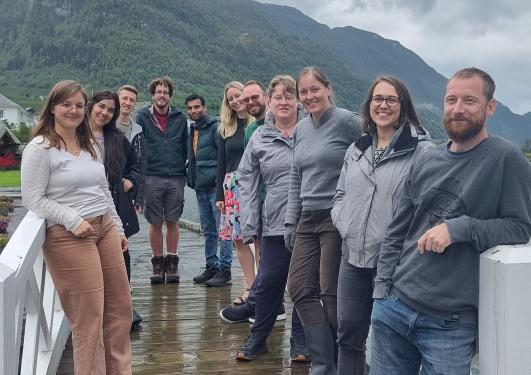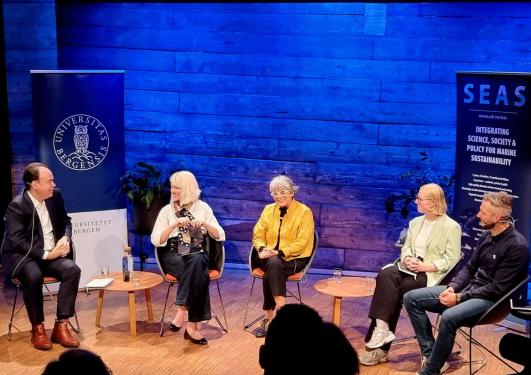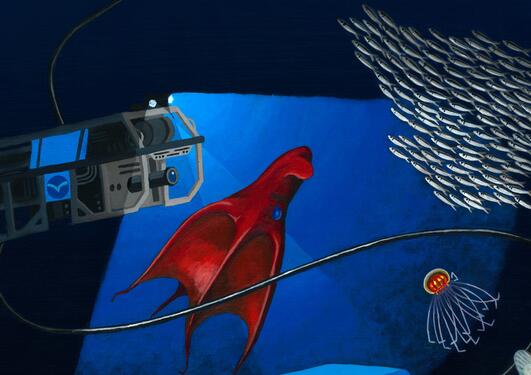News and Stories
Main content
2024

EVENTS: Annual Meeting, 2024
|Oct| Another year has passed - time for our annual meeting - and what a meeting it was! Keynotes, pitches, film cameras and lively discussions - more info to follow!
Take a look at the programme here!
EVENTS: Ocean Futures 2030
|September| You can watch our very own Joao leading the lively panel discussions at the recent Ocean Futures 2030:the state of our comon ocean governance - perspectives across sectors - here!
You can also read Joao's thoughts about reaching the 2030 goal of a sustainable ocean here.

EVENTS: Interdisciplinary retreat
|August| Escape to the fjords

Sometimes a change of scene (an infinity pool with a view of the fjords, for example) and a captive audience can make things happen!
SEAS brings together researchers from a wide range of fields, all looking at different aspects of marine sustainability - from archaeology to system dynamics, anthropology to geology - can our researchers find common ground to take on challenges within the field? This is what a group of them attempted in a recent retreat to Lofthus. You can read more here!

RECRUITING: Call 5 - down to the final fellow!
|June| Just one more position to fill! Check it out here!
EVENTS: Writing retreat - Osterøy
|May| On the back of the success of our 2022 writing retreat, a group of fellows headed off to the relative wilderness of the local island of Osterøy for another training and writing focus session with Mathew.

EVENTS: Bi-weekly meeting
|April| The SEAS bi-weekly meetings continue!
This week focused on interdisciplinary research and how to communicate your research effectively to different audiences. In this case, a science talk for the layman and interpreting different types of graphics from a range of fields.
Daniel used the group for feedback on his upcoming talk at One Ocean Week:"Observing the ocean: from outer space to the deep ocean". The talk is open to the general public and so needs to be understandable and informative to a wide audience - not an easy feat when your everyday language is all about "spectrometers", "backscattering" and "sequestration". The fellows provided constructive feedback, while being awed by some of the stunning graphics and the kinds of information Daniel's research into light in the deep ocean can provide.
The group dicussions were based around the use of graphics in different fields of research. Three different figures were shown and the groups had to decide which discipline the graphic was from, what they could understand from the figure and what was clear or unclear about each. A room full of bright people all with an eye for detail (and occasionally perhaps a penchant for the pedantic) never disappoints when it comes to a SEAS fellows critique. The fellows responsible for each figure then had to bravely step forward and give an overview of what the figure was meant to show - and clear up some heated discussions (what is a scale? is it a tree or an iceberg? why does Daniel hate that particular shade of blue?) - plus we all learnt a lot more about fjords.
But what do people really see in a graphic you've presented a dozen times? How transparent (or not) is the story you are trying to tell? Is there a better way to represent your data? Are the colours or the language you've used truly accessible? Will natural scientists and social scientists ever agree?



STORIES: Fellows foraging and gathering
Spring arrived (briefly) for the long Easter weekend and Ed and Aiste ventured out for some seaside foraging: urchins. Each urchin provides five pieces of roe - if you can get past the spines, best eaten raw with fresh lemon.



According to Aiste they taste "like the ocean on a breezy day" ...
STORIES: A wave to our neighbouring Sweden
Amit headed off to neighbouring Sweden and Gothenburg for his outgoing phase. He'll be spending 18 months at Chalmers University of Tehnology, collaborating with the Department of Mechanics and Maritime Sciences, as well as other local bodies related to maritime research and development.

Amit recently visited Gothenburg VTS (Vessel Traffic Service) office which is responsible for organizing and directing the safe movement of shipping traffic to and from the port. The Gothenburg VTS works in conjunction with the maritime pilots, who board the vessels entering or leaving the harbour and guide them safely in coordination with the ship´s crew. The port of Gothenburg has now decided to test out the concept of “Remote Pilotage” where the maritime pilots will not physically board the vessels but will guide them from ashore using various information and communication devices in addition to navigational instruments available at their disposal. The new concept of shore-based pilotage will be integrated into Gothenburg VTS to provide seamless support in the larger traffic movement. However, many knowledge gaps still exist, and the concept is being tried out systematically in phases with data collection both from the field and in simulation studies.
Amit will contribute to these efforts by interviewing the maritime pilots of Gothenburg port using Applied Cognitive Task Analysis methodology and elicit information related to operational process and cognitive demands. The findings from this this study will inform efforts to safely transition to this novel mode of shore-based navigational support for Gothenburg port.
STORIES: Home from home - a wee scottish adventure
It's been about 6 months now since Håkon left us for his outgoing phase, and swapped UiB and Bergen for the University of Strathclyde and the city of Glasgow. Håkon is one of our physicists, and is modelling light availability in the Barents Sea: "Light is a crucial parameter for the Barents Sea ecosystems with an extreme seasonality, and is influenced by clouds, sea ice, snow, and particulate and dissolved matter in the water, making it complex to model."
"Glasgow is a friendly and engaging city for a research stay, with multiple universities within the city, and a rich social history and cityscape." True to his field of interest, he's particularly chuffed to live near the River Kelvin - a name intrinsically linked with another physicist, William Thomson, more famously know as Lord Kelvin, who developed the unit of absolute temperature and the scale which bears his name.

Håkon has had some time on the weekends to explore a bit more of Scotland - from the Islands, including a trip to the Isle of Skye in stormy January - to the Highlands, where he was almost stranded after biblical rainfall flooded the railways.



Between the architecture, the landscape and the weather, it looks like you're feeling right at home Håkon!
STORIES: Stepping back in time
|February| Also off to find some sunshine - Kurt and Jeremy are heading off to join fellow SEAS member Asia and the SapienCE group for the rest of the field season in South Africa. They will be heading into remote areas to look at what the diverse geology can tell them about past changes in climate and sea level and how this impacted the distribution of early humans in the region, the changing nature of hunter-gatherer communities and their dependency on the ocean.
STORIES: Postcards from the Pacific
|February| Some of our "outgoing" fellows have left the chilly Norwegian winter behind, in favour of warmer climes. None have taken this to quite the same extreme as Ola though! Ola is starting his first period of fieldwork in the Marshall Islands of the tropical Pacific - some of the most isolated islands on the planet.
Ola is a political anthropologist and has been visiting these islands since 2013, studying local subsistence fishing in the outer atolls and the larger commercial fisheries and fish markets of the urban centres. Today he is looking at the role of transnational fisheries management in marine sustainability within the region from economic, environmental and social perspectives.


Ola is planning to join some fishing expeditions, where the crew from the market goes out for three of four days to collect what the local fishermen have caught - usually by spear fishing at night.
When he's not out in the field, the rest of Ola's outgoing phase is based at Radboud University in the Netherlands.
STORIES: When in Norway...
|January| It's been an unusually snowy winter this year in Bergen - a refreshing break from other forms of precipitation - and the perfect time to find out what it means to be Norwegian. They say Norwegians are born with skis on their feet. Which leads to the rest of us sometimes looking more like Bambi on ice - but that's not going to stop some of the fellows getting out and about with sticks on their feet and giving it a go.


STORIES: More short-term farewells
|January| SEAS outgoing fellow Amit headed over the border to Sweden this month to start the outgoing phase of his fellowship. Amit will be at the Chalmers University of Technology in Gothenburg for 18 months. He will be studying maritime safety and working conditions for seafarers as automation and digitization move the industry away from traditional maritime operations. Lykke til/lycka till/good luck, Amit!
Andreas is heading out to the west coast of the States and Scripps Instiitute of Oceanography in San Diego. Here he'll be setting up models for the ice-ocean interface, looking at how nutrients are transported by meltwater plumes in galciated fjords under warming climate scenarios. He'll also be visiting Greenland to see how such changing freshwater inputs and nutrient supplies impact real life in the Arctic, with the local residents and fisheries around Ilulissat.
And although she's not an outgoing fellow, we're also losing Konstanze as she heads to Canada and McGill University in Montreal for a 4-month research stay, collaborating with scientists working on ice sheet and sea level research.
Asia is also off for her second field season in South Africa with the SapienCE group, studying how early humans exploited coastal resources such as fish and seal during the Middle and Late Stone Ages.
2023

EVENTS: Deep Sea Mining Symposium
|December 4th| As the Norwegian government puts the decision to open the Norwegian continental shelf for mineral exploration and exploitation to the vote, Ed and Aiste assembled an interdisciplinary group of researchers to discuss this controversial field. Ranging from discussions on the geology and biology of the deep ocean, to legal and ethical questions, the two fellows led a packed day of enlightening, often challenging and occasionally even shocking discussions on the relentless pursuit of economic growth, the public’s perception of the deep ocean and the glaring gaps in the data. Read their round up of the day on the SEAS blog – follow the links and you can even listen to the talks: The future of deep-sea mining: symposium wrap-up - SEAS Programme UiB


EVENTS: Norwegian Association of Marine Researchers Annual Meeting 2023: Runde
Storms, powercuts, marine science
Samaneh, Joao, Juan, Øyvind
Annual meeting 2023 – Norsk Havforskerforening
Havforskarmøtet 2023 - Runde Forsking



RECRUITING: Call 4 - recruiting the final 3
This call was for the final 3 SEAS fellowships.
Call 4 open: November 15th 2023 - January 15th 2024
EVENTS: SEAS Annual Meeting 2023
November 15th - 17th saw the second of our SEAS annual meetings.
https://www.instagram.com/p/CzwQVT_I-Hf/?igsh=c3NxM2Ewamw5eGxl
Vice-rector Gottfried Greve at the annual 2023 SEAS meeting.






STORIES: Pint of Science
Juan and Aiste joined an evening science discussion


EVENTS: Iceland - Ed and Aiste
|Oct| Ed and Aiste travelled to Iceland to lead the symposium: Beyond deep-sea mining - Alternative narratives for ocean governance, as part of the Arctic Circle Assembly Meeting, 2023.
STORIES: Going, going, gone
SEAS isn't all about welcoming international postdocs into Bergen. As a Marie Skłodowska-Curie funded programme, SEAS is all about mobility, so we also have a number of outgoing fellows who will be living and working in different countries for a large portion of their fellowships.
So far we've waved off Nazar to Poland and now it's the turn for two more!
Håkon is moving to Glasgow to the University of Strathclyde to work with collaborators there studying the role of light in the ocean and how changes in this can have consequences for marine ecosystems and fisheries.
Samaneh is also off to the UK, and the bright lights of London at Imperial College, where she'll be designing and developing a geometric deep learning model for short- and long-term marine weather forecasting. Accurate weather forecasting is a key factor for the optimisation of shipping decarbonisation - from improving shipping routes to increasing energy production in offshore windfarms.
STORIES: Just popping out for a quick run ...
It's not all work and no play for our SEAS fellows! But everyone's idea of fun is different. For Ed, fun includes running 100 km through the Swiss Alps (www.swissalps100.com). 100 km and 6000 m elevation change in a smidge over 25 hrs.
At least we know his Norwegian sitteunderlag kept him warm! Well done Ed!

STORIES: OceanX cruise
Research cruises are often a highlight of the job for marine scientists, despite the logistics, planning and expense. But it's not often you get the opportunity to join the StarTrek of research vessels. In August 2023, three of our fellows, Mauro, Daniel and Juan, were lucky enough to take part in the Norwegian leg of the OceanX cruise. Ocean Explorer is owned by ... and can basically accommodate whatever marine science you can dream up. Free of charge. From helicopters to submarines and every piece of kit or lab in between, the OceanX set up is second to none. What an amazing experience for our fellows!
Juan: "My arrival to the vessel was… atypical. Yes, that’s the word. They sent a helicopter to bring me from Bergen since I joined mid-trip. I ended up using it two more times while looking for algae from the sky and going back to Bergen. Overall, I would describe the experience as like watching a bunch of 65-year-olds acting like they were 5 playing with new toys. One could see the excitement that our research fields awake in ourselves provided we have enough means to do so.
In my case in particular it was easy to use the motorboat to reach otherwise inaccessible coastal terrain and islands and gather algae samples. Then it was time to process and preserve said samples. The vessel had a fantastic wet lab for us. Each group had a space, and we could talk about our projects and milestones achieved on board. Daily science meetings were also a thing onboard. This time was used to discuss the next day of work and I enjoyed the collective input that was created there. On another note, the crew was experienced, kind and extremely helpful. And last but not least, the food was amazing. Summing up, a great experience that I was fortunate enough to join."
Read more about the experiences of the fellows here: links to follow
You can see more about the cruise on the OceanX page:
What OceanX Discovered in Norway
STORIES: Tour of the museum with our very own archaeologist
Asia took us for a guided tour of the SapienCE exhibition in the Natural History Museum



EVENTS: Summer gathering in Bergen
June 13th: Since we've had a lot of new arrivals recently and the summer has finally arrived, it was time for an inpromptu get-together!

RECRUITING: Call 3 - 6 positions announced
We had 6 positions advertised in Call 3.
Call 3 open: April 1st - June 12th, 2023
EVENTS: SEAS Gathering - IMR and the aquarium
Bergen is famous for its marine research and the university and the Programme itself has strong ties with the Institute of Marine Research. We spent the day visiting our Programme director Amund Måge at the instititute - along with the neighbouring seals and penguins in Bergen Aquarium, before dinner together in one of the oldest restaurants in town







STORIES: Clam up and dive in
Shut up and write but with a marine twist. Protecting your writing time can be tough as a researcher. The SEAS fellows decided after the writing retreat in 2022 to have weekly writing sessions - they gather, discuss the work they're planning on focussing on, then have about 2 hours of dedicated writing time, before checking back in - occasionally fuelled by pastries, cos who doesn't need a bit of incentive along with some accountability!
2022

EVENTS: Winter writing retreat
December 10th: There is nothing more Norwegian than a winter cabin trip or hyttetur. A brave few decided to keep up with the momentum from the Os writing retreat and have a weekend away in the mountains with nothing but fresh air, snow and the silence for inspiration.
A warning that things could be "chilly" maybe didn't accurately describe the frigid temperatures in the cabin when we arrived. Minus 15 °C inside and out, no running water and an oven that didn't want to warm up, lead to an interesting arrival. But once the fire was roaring and the pizza finally cooking, everyone started to feel a bit better.
Paul, Ed and Aiste took advantage of the beautiful conditions to get inspired - and the nearby ski resort to thaw out the typing fingers with some much needed hot chocolate, the all important kvikk lunsj - and even a festive fondue for julebord!
God jul!



EVENTS: Writing retreat - Os



EVENTS: SEAS Annual Meeting 2022






RECRUITING: Call 2 - recruiting for 23 fellowships
Call 2 open: August 1st - October 31st 2022
23 SEAS positions were advertised in this call
STORIES: Juan becomes a TV star



It’s a funny old thing academia. One minute you’re pottering in the lab with only snails to talk to, the next you’re standing in front of a camera in the middle of Bergen speaking in rapid Valencian with the bubbly producer of a well-known Spanish TV programme – all while defying the very un-Spanish temperatures.
Meet Juan – the first of our fellows to arrive and now star of the “Valencians al món” TV show!
Juan has had an interesting few years navigating the early academic career path, with the joys of the “two body problem” and international relocations. From Australia, he returned home to Spain just in time for the covid lockdowns to hit. And now he's taken another jump - here to Norway and our beautiful Bergen.
It’s fascinating to watch the process from the outside, as the producers set up the shots, find the perfect light and prep Juan with questions and camera angles. Even without understanding a word, you can feel his nerves – but ever the pro, once the camera starts rolling, one deep breath and Juan’s infectious enthusiasm takes over! He took the team out to his research site in Espegrend and gave them the perfect chilly but sunny tour of Bergen, including the epic views from Mount Fløyen and a bit of Hanseatic history in Bryggen. Apparently not everyone was too pleased with the Bergen weather though ...
"When they asked me about possible activties to do in Bergen, I thought: well, you could come and work with me. I tend to look at the practical side of things. In the end the cameraman put his shoe in a coastal puddle and we had to cut the morning short because the guy was freezing!"
He’s put together some highlights of the footage – including subtitles - but sadly not the puddle incident!
SEAS Fellow Juan Manuel Valero Rodríguez on Spanish TV
STORIES: Lunchtime sunshine
The sun is out - which means we're out getting our daily dose of Vitamin D for the weekly SEAS lunch!

EVENTS: SEAS fellows all at sea - our first offical meeting!




2021

RECRUITING: Call 1 - the first 18 positions are announced
ALL ABOARD!!
The SEAS Programme has officially started recruiting! Over the next few years we’ll be employing 37 postdocs across 6 of the 7 UiB faculties, all linked by the overarching theme of marine sustainability!
Call 1 open: August 1st - October 31st, 2021
In this call we had 18 positions advertised.
https://www.uib.no/en/seas/146484/call-1-18-seas-postdoctoral-research-fellow-positions-call-closed
NEWS: The SEAS Office is open for business!
This is us!
Programme Director: Amund Måge
Programme Manager: Kristin Bakken
Vice-manager: Liz Farmer
A contribution to the ocean science decade | SDG Bergen | UiB



